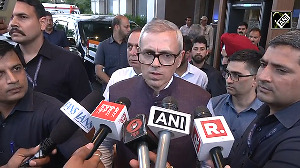
If India is shining today, the credit goes mostly to India's southern states. These states have played a major role in making India a global player and a force to reckon with.
According to a Confederation of Indian Industry study on 'Key factors making India a major global player: The Southern Stake,' cities like Bangalore, Hyderabad and Chennai have emerged as growth poles, creating centres of excellence in information technology, biotech and pharmaceuticals.
The study says that South India forms the backbone of India's comparative advantage in the services sector.
The study points out that southern states have also leveraged their traditional strengths in textiles, marine products, gems and jewellery and engineering. The states have led the way in producing 'knowledge workers' by creating centres of academic excellence, according to the CII study.
"Majority of India's H1-B visas are issued to South Indians, and Chennai has the longest waiting list for F1 visas," said Jayanta Roy, senior advisor, International Trade, CII, who prepared the study.
He said that the southern states are performing well above the national average in terms of gross domestic product growth.
The study points out that to be a major economic power and substantially reduce poverty by 2010, the roadmap ahead should be to rein in fiscal deficit, though macro indicators are mostly under control. Steps to reduce the huge transaction costs incurred for doing business in India need to be initiated soon.
"Nurture IT, biotech, pharmaceuticals as growth drivers for the economy and expand niche in the services sector and knowledge economy," states the CII study.
The study also says that it was important to leverage sunrise sectors in manufacturing like auto parts and components and other supply chain engineering products, to propel India as a global economic force.
The CII study also advocates 'work on creating growth clusters and investment in brand equity to recreate the success of Bangalore in other cities.'
The study urges heavy investment on infrastructure and removal of red tape, such measures being in line with the focus on reducing transaction costs on a national level. The study points out that the urban agglomeration of Bangalore alone contributes to around 40 per cent of India's services exports ($8 billion per annum) and around 12 per cent of goods exports ($6 billion per annum).
Dynamic clusters with sectoral specialisation, like Tirupur, exported $800 million worth of goods.
The study mentions that export-oriented growth strategy in China also centered around growth clusters. Currently, the Shanghai-Suzhou growth pole in China accounts for exports worth $182 billion, roughly three times India's national figure.
The CII study vouches for establishment of free ports with world-class logistics. "Make administrative procedures hassle free," asserts the study. It also calls for more investment in agriculture to create effective supply chains and expand value-added food processing industries.
As a way forward, the study also points out that India will have to effectively strategise between multilateralism and bilateralism. Trade liberalisation is inevitable and Indian industry will have to be prepared to grab the opportunities and minimise risks from globalisation, adds the study.
The CII study sets a target of increasing India's exports to 2 per cent of global exports (i.e. $178 billion) by 2010 in order for India to claim its rightful spot as a global player.
A GDP growth at a minimum of 10 per cent for the next decade is imperative if India is to emerge as an economic superpower and effectively address the issues of unemployment and poverty.
It suggests tariff rationalisation as per East Asian standards and liberalisation of consumer goods imports. The study also calls for establishment of dedicated trade policy division in all states to coordinate policy with Union ministry of commerce; such a move will be in keeping with the diversity of needs and priorities in a continental polity like India.







 © 2025
© 2025